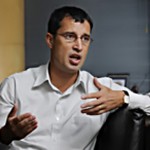
GlaxoSmithKline Plc (GSK) is grappling with a “war for talent” in China and India as the U.K. drugmaker struggles to retain sales representatives needed to expand in the world’s fastest-growing markets.
About 20 percent of Glaxo’s sales force in both countries quits each year in favor of better offers from rivals, said Abbas Hussain, 46, the London-based company’s president of emerging markets. That rate is about the same as the industry average in China and India, Hussain said in a March 28 interview at his office in Singapore.
“There’s a huge war for talent,” Hussain said. “It’s hard to do anything about. If you have a good person, they could find someone else willing to pay twice as much.”
Emerging markets and Asia Pacific accounted for about 17 percent of Glaxo’s sales last year, compared with 18 percent for rivals New York-based Pfizer Inc. (PFE) and 30 percent for Paris-based Sanofi-Aventis SA (SAN), according to data compiled by Bloomberg. Sanofi’s figure includes sales from its consumer-products division, which Glaxo’s doesn’t.
Glaxo is trying delayed incentive plans to retain staff and catch its competitors. The company aims to outpace growth in emerging markets, which will expand between 14 percent and 17 percent a year until 2014, according to IMS Health Inc., a Norwalk, Connecticut-based market researcher.
‘Safety Valve’
“All the other markets are slowing, and these regions are becoming the safety valve to stabilize revenue growth,” said Navid Malik, a drug-industry analyst at Matrix Corporate Capital in London, in a telephone interview.
Glaxo’s drug sales from emerging markets and Asia Pacific jumped 18 percent to 4.7 billion pounds ($7.5 billion) last year from 2009, outstripping market growth of 15 percent and helping to offset declining revenue in the U.S. and Europe, according to a company presentation.
Glaxo’s definition of emerging markets includes China, India, Mexico, Latin America, Africa, the Middle East and the Commonwealth of Independent States, and excludes Asia Pacific and central and eastern Europe. It plans to include Asia Pacific in its reported sales figures this year. Sanofi and Pfizer include Asia Pacific and central and eastern Europe in their definitions.
Sales Drop
Glaxo’s revenue in the U.S. declined 11 percent last year and in Europe it fell 6 percent, after the company stopped promoting its Avandia drug worldwide because of studies linking it to increased risk of heart attacks, and generic competition eroded sales of the Valtrex antiviral. Hussain said Glaxo expects to return to sales growth of “3 to 4 percent” by 2012.
Glaxo rose 17 pence, or 1.4 percent, to 1,217.5 pence at the close of London trading.
Drug companies have been turning to emerging markets as a way to increase sales of drugs after patents expire and generic competition cuts into revenue. While health-care reform in the U.S. and government austerity measures in Europe also have led to slowing sales in those markets, population growth and a burgeoning middle class in countries such as India are boosting demand for medicines.
Sales in emerging markets will reach about $400 billion by 2020, equivalent to current sales in the U.S. and the five biggest European markets combined, according to IMS.
Emerging markets are “not necessarily going to save the industry,” Hussain said. “It’s one leg of a three-legged stool” including the U.S. and Europe, he said.
Hussain’s Sales Force
Chief Executive Officer Andrew Witty hired Hussain, a 20- year veteran of Eli Lilly & Co., in 2008. He’s boosted the sales force in emerging markets and Asia Pacific to 17,000 since 2007, representing more than half of Glaxo’s global force of 30,000, Glaxo said. Sanofi has about 18,600 sales representatives in emerging markets, the company said in February.
The larger staff helped sales expand 21 percent to 572 million pounds in China last year, and almost doubled to 543 million pounds in Brazil, according to a presentation on the company’s website. Still, Glaxo is ranked 11th in sales in China and 14th in Brazil, according to the presentation.
“We were fairly late in our investments in China,” Hussain said. “We’re playing a little bit of catch-up.”
Price Cuts
Glaxo has cut prices to boost volumes in emerging markets, where it sells more doses than any other drugmaker and has the lowest price per dose of any of the top 10 pharmaceutical companies, Hussain said. Its 2010 operating profit margin was about 36 percent in emerging markets, compared with 66 percent in the U.S., the presentation shows.
The company has made 17 acquisitions in the past two and a half years, including paying about $253 million for Argentina’s Laboratorios Phoenix S.A.C.yF in June. Hussain said he expects to make fewer purchases in the near future.
“We’ve got plenty on our plate to just consolidate all the investments we’ve made so far,” he said. “We’re going to see far fewer acquisitions from GSK going forward.”
The prices companies are willing to pay to acquire drugmakers in emerging markets such as India are “unrealistic” and create equally unrealistic expectations for sellers, Hussain said.
“I don’t feel desperately that we need to do something in India,” he said. “There’s a huge opportunity to still grow that business organically.”
Hussain is the elder brother of former England cricket captain Nasser Hussain, and Benazir Hussain, a former dancer with the Royal Ballet.
Source Bloomberg

















